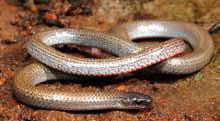Dr Theresa Knopp ‘Conservation Genetics of the Pink-tailed Worm Lizard in the ACT'
You are here

What can Population Genetics tell us about Habitat Fragmentation and Prioritising of Areas for Conservation in and near Canberra?
Dr Theresa Knopp is a Post-Doctoral Fellow in the Institute for Applied Ecology, University of Canberra, with a passion for amphibians and reptiles. In 2009 she was awarded a PhD at the University of Helsinki for a thesis on the phylogeography and population genetics of the endangered Moor frog, Rana arvalis, in Northern Europe. She has studied the genetics of Malagasy dung-beetles and since October 2010 has been at the University of Canberra researching the population genetics of the Pink-tailed Worm-lizard, Aprasia parapulchella. Her research will provide information on population genetic structure or patterns of gene flow of this small, endangered species that will assist in its conservation.
The Pink-tailed Worm Lizard is a small and cryptic legless lizard with a current distribution largely confined to the ACT. With the increasing threats posed by urban development, concerns have been raised about the long term survival of the species, along with an urgent need for a comprehensive management plan. Population genetic methods have been combined with GIS mapping to identify the regionally most important populations and the main barriers and corridors for dispersal in this endemic species. Theresa will explain the methods used and results gained thus far.

